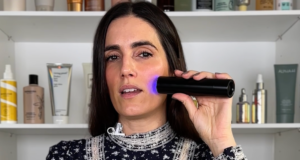
From deep dives on metabolic health to the dangers of the American food system, functional health doctor Mark Hyman isn’t afraid to get into it on his Instagram page. Dr Hyman, who has 3.1 million followers, multiple successful books, two podcasts and various wellbeing companies under his belt, has been treating patients for 30 years by focussing on the root causes of disease and health issues, and addressing them accordingly.
“My mission in life has really been to end a lot of needless suffering by helping people access data and information that isn’t currently integrated into healthcare,” he says. It’s not that the information – whether that’s the impact of environmental toxins or how important our microbiome is – isn’t there, Dr Hyman notes, it’s just that many of us can’t easily access it in a digestible way.
With the recent launch of his Health Hacks podcast – which explores everything from hangover cures to the truth about fasting – Dr Hyman is on a mission to educate his audience on how to live a healthier, happier life, and be proactive about doing so.
We’re all feeling bad
In one of the episodes – Feeling Awful? Discover Why and Fix It Fast – Dr Hyman explores why so many of us feel slightly subpar, without really realising it. “Many of my patients tell me they didn’t know they were feeling so bad, until they started feeling good,” he says. “Often, they have been dismissed as depressed or anxious by the healthcare system, so they don’t get a proper answer as to why they’re feeling that way.”
While the US healthcare system is different to ours here in the UK, an overburdened NHS can sometimes mean we don’t seek or get the attention we might need – our medical system tends to treat full-blown illness, rather than underlying malaise, says Dr Hyman. “There are now more insults to the bodily system, including the degradation of food, lack of exercise, more stress, less sleep, environmental toxins and the [ominpresence of social media] – all of these things unfortunately drive us into serious dysfunction.” Slowly and steadily, they build up over time and can eventually impede our health.
Diet is the biggest health lever we can pull
“How we eat can make us feel good or bad – most people don’t really know that, and if they do, they don’t know where to start,” says Dr Hyman. “I put many of the people I see in my clinical practice – who are chronically ill and/or highly inflamed – on a reset diet, called the 10-day detox.” Dr Hyman, who has written a book about his approach, instructs individuals to remove ultra-processed foods, sugar, alcohol, gluten, dairy, grains and anything potentially inflammatory from their meals, while adding in whole foods, lots of colourful phytonutrients, fruit and vegetables. Within three or four days, he says, most people see a dramatic improvement in their overall quality of life and health, whether they’re suffering from sleep issues, anxiety, weight and sleep issues, or more serious diseases. “Sugar causes a lot of inflammation, and that’s what’s making many of us feel like crap, basically.”
How we can promote longevity
Longevity is this year’s biggest buzzword, but how exactly can we go about tapping into it? Again, Dr Hyman explains it’s all about addressing the root causes of inflammation, and then taking steps to reduce it – resetting your biology, is the appealing phrase he uses. As well as addressing your diet, it’s about “exercise, optimising your sleep, helping to regulate your nervous system through stress reduction, lowering your exposure to environmental toxins and building community relationships”, he explains. All lifestyle changes that are within reach for most of us.
Supplements do deserve a place in our routine
It depends who you ask, but some health experts are critical about the role supplements play within our routines – so should we be relying on them, or not? “If you’re hunting and gathering all your own wild food, drinking pristine water, have no toxin exposure, sleep nine hours a night and experience no chronic stress, then no, you don’t need to supplement,” Dr Hyman says, drily. “But the rest of us do.” A good quality multivitamin, fish oil, vitamin B, magnesium and probiotics are “foundational for most people”.




